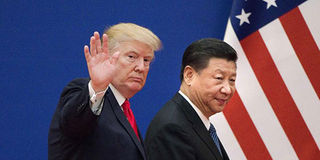There’s more to souring US-China trade relations than just tariffs

US President Donald Trump (left) and China's President Xi Jinping leave a business leaders event at the Great Hall of the People in Beijing on November 9, 2017. Trump says their friendship could be over. PHOTO | NICOLAS ASFOURI | AFP
What you need to know:
- Nothing better demonstrates Beijing’s ambition for global dominance than President Xi’s proposed One Belt, One Road Initiative.
- China has topped America as Africa’s leading trading partner, which accounts for Washington’s characterisation of Chinese loans to the developing world as colonialist.
Early in the year, US President Donald Trump imposed tariffs on limited Chinese imports to force Beijing to change its trading practices which Washington deems unfair and predatory.
Last week, the list swollen to thousands worth a staggering $200 billion (Sh20tn) and attracting a 10 percent tariff.
The tariffs kick in this week and, to make matters worse, President Trump warned that if Beijing retaliated as it has done twice in the recent past Washington would target more goods worth about $500 billion and raise the tariffs by 25 percent in January.
Importantly, President Trump announced the new tariffs as American and Chinese diplomats and money men prepared to start negotiations regarding an amicable solution or consensus on the way forward in the souring trading relations between the world’s two most powerful economies.
POLICY
That says President Trump is holding a gun to counterpart Xi Jinping’s head: Give me what I want on trade or I will force it out of you painfully.
Put another way, the question that emerges is whether this is just about trade or is there more to it. I choose the latter and here’s why.
Upon the collapse of the Berlin Wall in 1989 and as the Union of Soviet Socialist Republics declined, I wrote in 1990 that America, in the absence of the Red Bear, needed a new adversary for its foreign policy to thrive. I argued that Islamic Fundamentalism had replaced the Red Bear.
Islamic Fundamentalism was replaced by terrorism, with President George Bush declaring in the wake of the September 11, 2001 plane attacks on the Twin Towers in New York and the Pentagon in Washington that nations were either with America or with the terrorists.
George W, as he was known, also in January of 2002 framed Iraq, Iran and North Korea as the Axis of Evil as America’s and by implication and association, the world’s triple enemies. George W’s was called the Doctrine of Pre-emption.
RED BEAR
But his successor, President Barack Obama, who inherited his two wars in Iraq and Afghanistan, sought to switch to a world order that would dialogue and bring peace to the Middle East and Iran into the comity of nations.
Now Trump the candidate branded China the predator of the global market.
He accused it of restricting its market for US businesses while enjoying unfettered access to America’s; manipulating the yuan at the expense of the dollar; and stealing America’s ideas on industry and technology.
President Trump is ostensibly enforcing the trading line against China he drew on the campaign trail.
China is Trump’s Red Bear; the trade war vehicle for checking China’s rise to superpower status and share in world dominance. But these are only the first salvos in what will be a long Cold War.
TRADE
One, China overtook the US as the world’s leading trading nation in goods in 2013; its economy is growing at about twice the rate of the global economy; is set to overtake the US as the world’s largest economy by GDP before or about 2030; and it is destined to become the world’s biggest market for consumer goods.
Two, nothing better demonstrates Beijing’s ambition for global dominance than President Xi’s proposed One Belt, One Road Initiative, a global roadmap that links China to the rest of the world in an intricate transport infrastructural, trading and geostrategic network.
Three, Beijing is also building a network of global allies via the Belt Road Initiative and its generous loans to the developing world.
China has topped America as Africa’s leading trading partner, which accounts for Washington’s characterisation of Chinese loans to the developing world as colonialist.
DOMINANCE
Four, unlike the economically and technologically weak USSR, China poses a substantial threat to America’s economic and, therefore, political dominance of the world. Dominant players do not hand over to heirs to their supremacy without a fight.
President Trump may have intimidated impoverished Pyongyang away from sabre rattling about striking America with long range intercontinental ballistic missiles with threats of total destruction and never before seen fire and fury. But Beijing will not be bullied.
Five, because Beijing does not have as many goods to export to America it will seek other means of countering Washington’s trade war and may impose more restrictions on American businesses in or seeking to do business in China.
Last, Beijing’s massive man-made islands complete with military bases in the South China Sea is a continuing theatre of conflict over maritime trade, law and regional supremacy.





